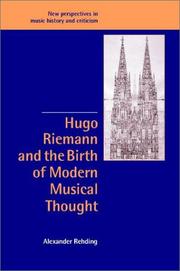| Listing 1 - 3 of 3 |
Sort by
|
Book
ISBN: 9780199367832 9780195321333 0195321332 Year: 2014 Publisher: New York Oxford University Press
Abstract | Keywords | Export | Availability | Bookmark
 Loading...
Loading...Choose an application
- Reference Manager
- EndNote
- RefWorks (Direct export to RefWorks)
Théorie --- Riemann, Hugo, --- Théorie --- Music theory --- Music --- Musical theory --- Theory of music --- Theory --- Riemann, Karl Wilhelm Julius Hugo, --- Riemann, Carl Wilhelm Julius Hugo, --- Riman, Gugo, --- Riemann, H. --- Riemann, Ugo, --- Criticism and interpretation. --- Musique --- Handbooks, manuals, etc --- Guides, manuels, etc --- Riemann, Hugo --- Duitsland

ISBN: 9780521096362 9780521820738 0521820731 9780511481369 0511481365 0511061781 9780511061783 0511070241 9780511070242 0521096367 1107136350 9781107136359 0511179286 9780511179280 1139148885 9781139148887 0511055455 9780511055454 0511306318 9780511306310 128043080X 0511095880 Year: 2003 Volume: 11 Publisher: Cambridge New York Cambridge University Press
Abstract | Keywords | Export | Availability | Bookmark
 Loading...
Loading...Choose an application
- Reference Manager
- EndNote
- RefWorks (Direct export to RefWorks)
Hugo Riemann (1849-1919) is generally acknowledged as the most important musicologist of his age. By analyzing his musical thought within the turn-of-the-century context of interest in the natural sciences, German nationhood and modern technology, this book reconstructs how Riemann's ideas not only "made sense" but advanced a belief of the tonal tradition as both natural and German. Riemann influenced the ideas of generations of music scholars because his work coincided with the institutionalization of academic musicology around the turn of the last century.
Riemann, Hugo --- Music theory --- Musicology --- Théorie musicale --- Musicologie --- History. --- Histoire --- Riemann, Hugo, --- Criticism and interpretation. --- Music --- Musical research --- Research, Musical --- Popular music --- Research --- Historiography --- Riemann, Karl Wilhelm Julius Hugo, --- Riemann, Carl Wilhelm Julius Hugo, --- Riman, Gugo, --- Riemann, H. --- Riemann, Ugo, --- Riemann, Hugo - 1849-1919

ISBN: 0521820731 0521096367 0511095880 1107136350 0511179286 0511061781 0511055455 0511306318 0511481365 128043080X 1139148885 0511070241 9780521096362 9780521820738 Year: 2005 Publisher: Cambridge Cambridge university press
Abstract | Keywords | Export | Availability | Bookmark
 Loading...
Loading...Choose an application
- Reference Manager
- EndNote
- RefWorks (Direct export to RefWorks)
Generally acknowledged as the most important German musicologist of his age, Hugo Riemann (1849-1919) shaped the ideas of generations of music scholars, not least because his work coincided with the institutionalisation of academic musicology around the turn of the last century. This influence, however, belies the contentious idea at the heart of his musical thought, an idea he defended for most of his career - harmonic dualism. By situating Riemann's musical thought within turn-of-the-century discourses about the natural sciences, German nationhood and modern technology, this book reconstructs the cultural context in which Riemann's ideas not only 'made sense' but advanced an understanding of the tonal tradition as both natural and German. Riemann's musical thought - from his considerations of acoustical properties to his aesthetic and music-historical views - thus regains the coherence and cultural urgency that it once possessed.
Music theory --- Musicology --- History. --- Riemann, Hugo --- Criticism and interpretation --- History --- Music --- Theory --- Musical research --- Research, Musical --- Popular music --- Research --- Historiography --- Riemann, Hugo, --- Riemann, Karl Wilhelm Julius Hugo, --- Riemann, Carl Wilhelm Julius Hugo, --- Riman, Gugo, --- Riemann, H. --- Riemann, Ugo, --- Criticism and interpretation. --- 78.20 Riemann --- Riemann, Hugo - 1849-1919 --- Théorie musicale --- Musicologie --- Histoire
| Listing 1 - 3 of 3 |
Sort by
|

 Search
Search Feedback
Feedback About UniCat
About UniCat  Help
Help News
News